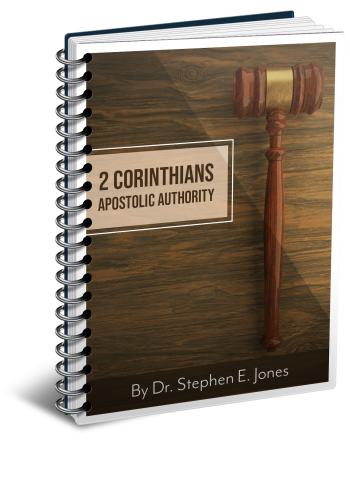Latest Posts
View the latest posts in an easy-to-read list format, with filtering options.

An in-depth commentary/study on the second book of Corinthians
Category - Bible Commentaries

2 Corinthians 7:10 reads,
10 For the sorrow that is according to the will of God produces a repentance [metanoia] without regret, leading to salvation; but the sorrow of the world produces death.
Paul was happy to hear from Titus that the Corinthian church had repented with “sorrow that is according to the will of God.” Godly sorrow is to be genuinely sorry for what one has done. It leads to a reversal of thinking or decisions (i.e., repentance) and results in a new course of behavior and a change of mind and attitude. The Emphatic Diaglott renders metanoia as “reformation.”
By contrast, the world’s sorrow “produces death.” In extreme cases, of course, worldly sorrow may result in suicide, but Paul understands a broader way of looking at death. Worldly sorrow is depressive, for it lacks forgiveness and resolution. It tears a person down without rebuilding him. It often offers no forgiveness, except on impossible terms. Its forgiveness often remains conditional, because it is not based on love.
Paul was glad to know that the church was experiencing godly sorrow. 2 Cor. 7:11 says,
11 For behold what earnestness [spoude] this very thing, this godly sorrow, has produced in you; what vindication [apologia] of yourselves, what indignation, what fear, what longing, what zeal, what avenging of wrong! In everything you demonstrated yourselves to be innocent in the matter.
First, Paul’s letter of admonition produced “earnestness” in them. The Greek word is spoude, “haste, diligence, earnestness.” In other words, they quickly acted upon Paul’s instruction to deal with the man in question who was guilty of incest.
Second, Paul says that they had indeed vindicated themselves (apologia). The Emphatic Diaglott reads, “What an apology!” The word means “plea, answer, clearing of self, self-defense.”
Next, Paul says, “what indignation!” using the word aganaktesis, whose root word means “moved to indignation, irritated, vexed.” In other words, Paul was impressed that his letter lit a fire under them, causing them to rise up in righteous indignation at the sin in their camp.
“What fear!” Paul says. The church feared (phobos) the possible consequences of divine judgment if they delayed in resolving this problem. Perhaps they thought of the sin of Achan in the camp of Israel, which resulted in the loss of the battle of Ai and the death of 36 Israelites (Joshua 7:5).
“What longing!” Paul continues. The church had a great longing or desire (epipothesis) to do what was right or to rectify the situation.
“What zeal!” The church was zealous (zelos) in pursuing the resolution to the problem.
“What avenging of wrong!” Paul uses the term ekdikesis, “to do justice.” This term is often rendered “revenge” or “avenge,” which gives the wrong impression. In the English language we associate vengeance with vindictiveness, taking the law into one’s own hands, and judging matters according to one’s emotional anger or hatred. But godly ekdikesis seeks true justice according to the mind of God, and we know that divine justice flows out of His character of Love.
God’s emotion in taking “vengeance” is His passion, rather than anger as we know it. The so-called “wrath of God” literally means “the heat or passion of God.” The law instructed men to set up a governmental system of justice to avoid personal emotions getting in the way of true justice. So Lev. 19:18 says, “You shall not take vengeance… but you shall love your neighbor as yourself.”
God again reminds Israel in Deut. 32:35, “Vengeance is Mine, and retribution.” In other words, do not take the law into your own hands. If you believe you have a case against your neighbor, let the judges decide the case impartially. The judges were ordained to administer the law according to the mind of God.
The Hebrew word for vengeance is naqam. Nahum 1:2 says, “A jealous and avenging [naqam] God is the Lord.” Nahum himself was named according to a homonym nacham, which is pronounced almost the same as naqam. Nahum recognized this and played upon this fact in his prophecy. While naqam means “vengeance,” nacham means “comfort.” (See Nahum 3:7.)
The vengeance of God is not administered apart from the Holy Spirit, who is called the Comforter (KJV). In other words, there is no justice without hope and comfort, because divine justice, coming out of a heart of love, is designed to correct people for their own good. That is why Jesus said that the Comforter (or “Helper,” NASB) “will convict the world concerning sin and righteousness and judgment” (John 16:8). The same Holy Spirit that comforts and helps us is the one who convicts the world of sin. His judgment is loving, whether we realize it or not.
So this is the force behind Paul’s statement to the Corinthian church, “What avenging of wrong!” The church did not carry out some great vengeance as we might picture it. They did not hang the guilty party. Instead, they carried out divine justice according to the mind of God. No doubt they prayed diligently before coming to a decision, seeking to know the mind of God and the balance between justice and mercy. Their sentence was designed to save the man, not to destroy him.
Paul concludes: “In everything you demonstrated yourselves to be innocent in the matter.” He commends them for doing precisely what they needed to do. Perhaps Paul could be viewed as a type of Supreme Court Justice reviewing the case from the lower court. Finding no fault with their administration of justice, he gave his stamp of approval and commended them for their righteous judgment.
Paul writes in 2 Corinthians 7:12, 13,
12 So although I wrote to you it was not for the sake of the offender, nor for the sake of the one offended, but that your earnestness on our behalf might be made known to you in the sight of God. 13 And for this reason we have been comforted….
Here Paul steps back to remind the church of the big picture. This case was not merely about adjudicating a dispute between two parties. His purpose was not to advocate for the guilty man, nor to defend one who had been offended. There was a higher purpose in all of this, for God was testing the church’s “earnestness” or diligence (spoude).
Because the church passed this important test, proving their earnestness toward God, Paul was “comforted.” Once again, we see in this statement the implied connection between naqam and nacham. The church had administered divine justice with comfort to the body of Christ.
Paul continues in 2 Corinthians 7:13, 14,
13 … And besides our comfort, we rejoiced even much more for the joy of Titus, because his spirit has been refreshed by you all. 14 For if in anything I have boasted to him about you, I was not put to shame; but as we spoke all things to you in truth, so also our boasting before Titus proved to be the truth.
Apparently, Paul had “boasted” to Titus about the character of the Corinthian church. Paul was very proud of that church and had great confidence that they would do the right thing. When Titus visited them, he found Paul’s confidence to be proven by the facts. Titus saw the diligence of the church for himself, and so, Paul says, “I was not put to shame.” The church did not embarrass Paul, nor did he lose face.
When we look at the various churches and denominations today, it is probably true that many of them would be an embarrassment to their founders, if they were still alive. Jesus Himself, as the true Head of the church, would have the most reason to be embarrassed by the church’s corruption over the years. However, He has made a New Covenant, wherein He has promised to write His law in our hearts (Heb. 8:10). So in the end, in spite of all the degeneration and lawlessness in the church, He will have reason to be proud of the church.
Paul concludes this chapter in 2 Corinthians 7:15, 16,
15 And his affection abounds all the more toward you, as he remembers the obedience of you all, how you received him with fear and trembling. 16 I rejoice that in everything I have confidence in you.
Titus was received “with fear and trembling.” This expression is an idiom, of course. The Corinthian church was not literally trembling with fear when Titus came to them. It indicates that they received him with great respect and excitement. So Paul had great confidence in the Corinthian church.